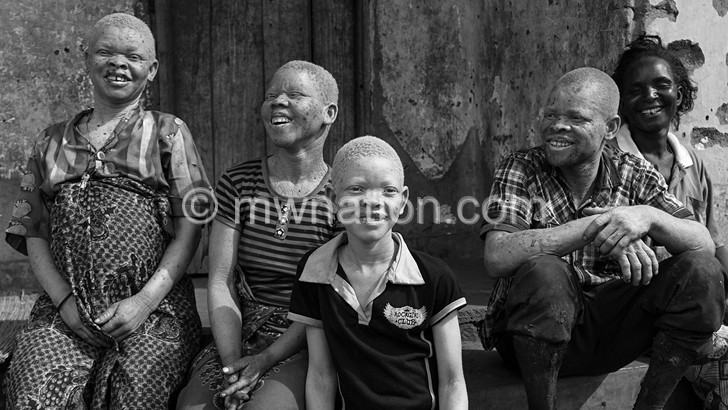Killed for our bones
Rights group bemoans slow pace of justice after attacks, including murders, leaving those with albinism feel vulnerable.
Malawi’s refusal to push forward with prosecuting suspects accused of attacking and killing people with albinism has left a persecuted minority on the edge, according to the Association of Persons with Albinism in Malawi (Apam).
Boniface Massah, national coordinator of Apam, told Al Jazeera on Wednesday that the government’s failure to conclude cases demonstrates that “security has not improved”, leaving the estimated 10 000-strong community vulnerable and anxious.

“We face a high risk of attack and we have seen government commitment in words, but not in action,” Massah said.
Albinism is a genetically inherited condition. It often results in the lack of pigmentation in the skin, hair and eyes.
Since late 2014, human rights organisations noted a rise in attacks on persons with albinism in Malawi.
The attacks stem from a belief that body parts belonging to people with albinism contain magical powers.
Criminals, allegedly members of gangs across southern and central Africa, have abducted scores of people with albinism, hoping to sell their body parts on the black market.
Amnesty International, the UK-based rights group, says there have been at least 115 attacks, including 20 murders, since 2015.
At least 35 cases have been prosecuted, while 43 others are under investigation. No murder cases have been concluded.
Massah said that the lack of punitive action had left people with albinism feel “very vulnerable”.
“Students have not returned to school, adults are avoiding going to work, and restricting their movement and this is impacting their livelihoods,” Massah said.
Responding to claims that action remained slow, Nicholas Dausi, Malawi’s minister of information, told Al Jazeera that his government was aware of the shortcomings but said that there had been a reduction in crimes against those with albinism.
“As a government, we are saying that we are committed, and asking people to come forward and assist us,” Dausi said.
“If there is anybody who feels that justice is not served, they should come forward,” he added.
Deprose Muchena, director of Amnesty International Southern Africa, confirmed that the government had demonstrated commitment to addressing the scourge, but added that the community “was still living in fear”.
“This year, there were five attacks, including two murders … the fact that one of the murders took place in Lilongwe itself is very daring because usually these attacks happen in isolated, rural areas,” Muchena said.
“The government needs to speed up cases.The lack of action energises attacks,” he said
Still shaken
Clement Gweza, a teacher in Dedza in central Malawi, told Al Jazeera that he is still shaken by the murder of his student David Fletcher back in April 2016.
Fletcher had been abducted from the village and found days later, murdered and dismembered in neighbouring Mozambique.
“I tell Latida [another student with albinism in his school] not to travel alone, and I also take special care at night, because I know these people are looking for us,” Gweza said, ading that the community suffers “widespread societal discrimination, including verbal abuse and exclusion from accessing basic public services”.
Experts say that people with albinism also endure discrimination at schools and hospitals.
In June 2016, the situation was deemed so bad that Ikponwosa Ero, a United Nations independent expert on human rights and albinism, said that the community faced ‘systematic extinction’ if action was not taken.—Azad Essa & Sorin Furcoi, Al jazeera
KILLED LIKE A GOAT
It was a Sunday in April 2016. A warm, dry day. Seventeen-year-old David Fletcher was being moody and withdrawn. He wanted to watch a football match at the local school instead of helping his family gather maize in the fields. His parents eventually relented and let him go.
When he did not return later that day, they searched the village, but could not find David.
The next day, they walked to the nearest police station to report him missing. Then they waited.
A week later, the local police chief came to their home to deliver the news: David’s dismembered body had been found, 80km away, in neighbouring Mozambique. It was badly decomposed, he told them. It couldn’t be brought to the village for burial, but he could bring the arms and legs, if they wished. And if the family could afford the journey, they could visit it where it was found.
“He was dead. What benefit was there to see his dead body?” Fletcher Machinjiri, David’s 65-year-old father, asks, dismissively. “It was too expensive for us.”
Fletcher is sitting outside his house. His 53-year-old wife, Namvaleni Lokechi, sits beside him. Her face is expressionless. Their 32-year-old daughter Mudelanji and 21-year-old son Manchinjiri sit on the hard earth a few metres away. They listen as though it is the first time they have heard the story.
“He was killed like a goat at a market,” Lokechi says, staring into the distance. “His arms and legs had been chopped off. They broke off some of his bones. His skin was hanging. And they buried him in a shallow grave.”





